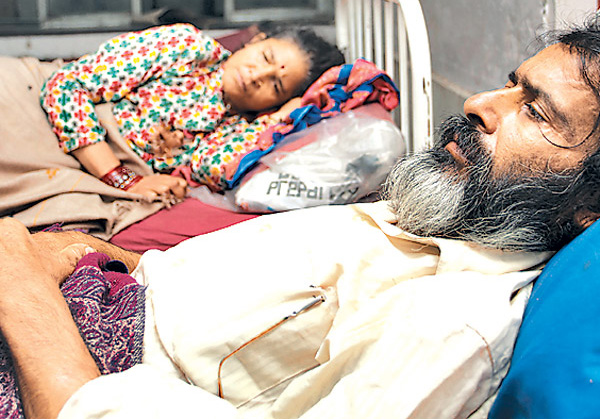
Sep 26, 2014 | News
The government of Nepal has failed for over a decade to deliver justice for the killing of Krishna Prasad Adhikari. In protest his father, Nanda Prasad Adhikari, died on September 22, 2014, after over 300 days on hunger strike, the ICJ and Human Rights Watch said today.
Nanda Prasad Adhikari and his wife, Ganga Maya Adhikari (photo), began their hunger strike on October 23, 2013, to protest the failure of successive Nepali governments to ensure a credible investigation of the killing in 2004 of their son, allegedly by members of the United Communist Party of Nepal–Maoists (UCPN-M).
The ICJ and Human Rights Watch call on the Nepali government to protect the human rights of Ganga Maya Adhikari, who is reported to be in critical but stable condition in Kathmandu’s Bir Hospital. She continues to refuse food even after her husband’s death.
“Nanda Prasad Adhikari made the ultimate sacrifice in the pursuit of justice for his son, but it should never have come to this sad moment,” said Sam Zarifi, ICJ’s Regional Director for Asia and the Pacific. “The Adhikari couple symbolize the thousands of people in Nepal who demand justice for the violations and abuses they suffered at the hands of the government’s armed forces as well as the Maoists.”
Despite several promises by the government, there has been little movement towards accountability for Krishna Adhikari’s death.
In September 2013, after initial protests by the Adhikari couple, Nepali authorities announced that they would follow the Supreme Court’s directive to investigate the killing.
One year later, in April 2014, the Chitwan District Attorney filed charges against 13 people allegedly involved in the killing of Krishna Prasad Adhikari.
But when two men were arrested and produced in court, UCPN-M leaders protested, with leader Babu Ram Bhattarai saying publicly that if Parsuram Poudel, one of the accused, could be arrested, the government should arrest Bhattarai as well.
After three days of protests and threats by the UCPN-M, the Chitwan District Court granted bail to the two suspects. The case is still pending in court.
Throughout this period, the Adhikaris continued their hunger strike, pointing out serious flaws and shortcomings in the investigation carried out by Nepali authorities.
“Nepali politicians should stop making empty promises and investigate all allegations of human rights abuses and violations during the conflict,” said Brad Adams, Asia director for Human Rights Watch. “Nanda Prasad Adhikari’s death highlights Nepal’s flawed attempts at reconciliation and redress for conflict-era crimes, and looks like a desire to sweep all wartime injustice under the rug.”
The Comprehensive Peace Accord (CPA) that ended the conflict in 2006 explicitly recognizes Nepal’s obligations under international human rights law without reservation.
The CPA is unequivocal about the need to investigate and prosecute human rights violations in line with Nepal’s laws.
A promised Truth and Reconciliation Commission remains stalled, and the draft legislation to promulgate it is deeply flawed.
The ICJ and Human Rights Watch call on Nepali authorities to continue investigations and prosecutions for Krishna Adhikari’s death, as well as hundreds of unresolved cases of enforced disappearances and extrajudicial executions.
Contact:
Sam Zarifi, ICJ’s Regional Director for Asia and the Pacific, t +66-807-819-002 (mobile); e: sam.zarifi(a)icj.org
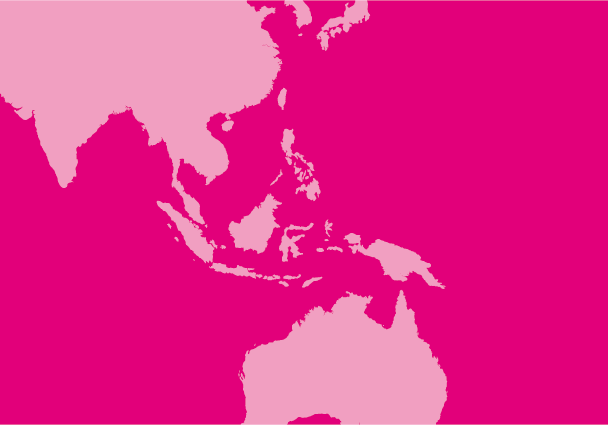
Sep 24, 2014 | News
The ICJ expressed concern at the promulgation of a constitutional amendment that empowers the Bangladesh Parliament to impeach judges of the Supreme Court.
The ICJ urges the Government to ensure the impeachment provision meets its obligations under the International Covenant on Civil and Political Rights and international standards on the independence of the judiciary.
“Parliament must prescribe adequate safeguards to ensure the newly enacted impeachment provision meets international standards for protecting the independence of the judiciary and the right to a fair trial,” said Sam Zarifi, ICJ’s Director for Asia and the Pacific. “Without such safeguards, the looming fear of arbitrary and politically motivated impeachment would create an environment in which judges would be unable to exercise their judicial functions independently and impartially, especially in cases involving the Government.”
On 22 September 2014, President Abdul Hameed gave his assent to the 16th constitutional amendment, which was passed unanimously by the Bangladeshi Parliament on 17 September 2014.
The amendment empowers Parliament to impeach judges of the Supreme Court on the grounds of “proven misbehavior or incapacity” by passing a resolution supported by at least a two-third majority of parliamentarians.
To exercise this power, Parliament has to first pass a law to regulate the procedure in relation to investigation and proof of the misbehavior or incapacity of a judge that would lead to an impeachment.
International standards on the independence of the judiciary, including the UN Basic Principles on the Independence of the Judiciary, the Commonwealth Principles on the Accountability of and the Relationship between the Three branches of Government, and the Beijing Statement of Principles of the Independence of the Judiciary, stipulate that judges shall be subject to suspension or removal only for “reasons of incapacity or behavior that renders them unfit to discharge their duties”.
The phrase “proven misbehavior or incapacity” in the Bangladeshi amendment will have to be interpreted and applied in line with this relatively high threshold.
“Impeachment of judges must be an exceptional measure, reserved for cases of gross misconduct,” said Zarifi. “Unless Parliament takes great care to ensure the law regulating and clarifying the impeachment procedure follows international law and standards on the removal of judges, the constitutional amendment can only be interpreted as an assault on the independence of the judiciary.”
Any removal proceedings must meet international standards on fair trial and due process.
A judge at risk of being disciplined or removed must be accorded the right to be fully informed of the charges; the right to be represented at the hearing by council of choice; the right to make a full defense; and the right to be judged by an independent and impartial tribunal.
“The actions that Parliament might take under the impeachment amendment are particularly worrying given the Awami League Government’s recent record of passing a series of regressive laws and policies relating to human rights,” added Zarifi. “After clamping down on the operation of civil society groups and restricting freedom of expression of the media and human rights defenders, it appears that the Government is now looking to target the judiciary.”
An independent and impartial judiciary is central to the protection of human rights and the rule of law.
The ICJ therefore urges the Bangladesh Parliament to safeguard judicial independence by ensuring that the laws governing the impeachment procedure meet international law and standards on the independence of the judiciary and the right to a fair trial.
Contact:
Sam Zarifi, ICJ Asia Pacific Regional Director (Bangkok), t: +66 807819002; e: sam.zarifi(a)icj.org
Reema Omer, ICJ International Legal Adviser (London), t: +44 7889565691; e: reema.omer(a)icj.org
Sep 23, 2014 | News
The ICJ today called on the Syrian authorities to request that all pending criminal charges against Mazen Darwish (photo), Hussein Gharir and Hani Al-Zitani be quashed, and to release the three prominent Syrian human rights defenders immediately and unconditionally.
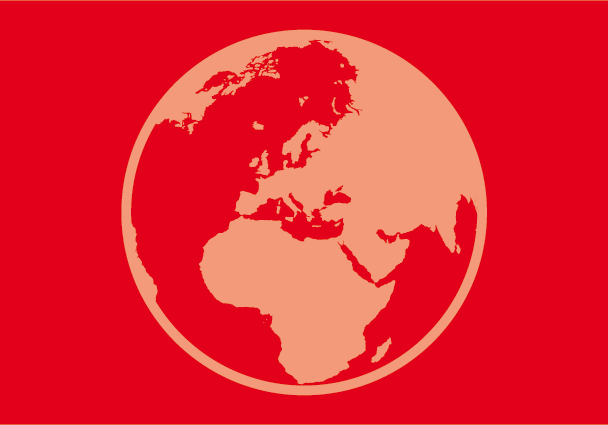
Sep 22, 2014 | Events, News
The ICJ’s Director of the International Law and Protection Programmes, Alex Conte, was today an expert member of a plenary panel of the UN Human Rights Council concerning the application of international law to the use of armed drones.
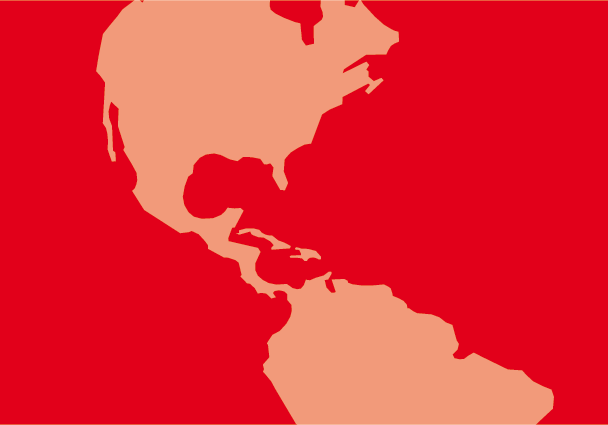
Sep 22, 2014 | News
Comunicado de la CIJ tras sua visita a 12 comunidades de San Juan Sacatepéquez afectadas por la construcción de una cementera y la carretera necesaria para comercializar la producción.
La Comisión Internacional de Juristas a la comunidad nacional e internacional expresa:
1. Con fecha viernes 12 de septiembre del presente año la CIJ llevó a cabo una visita a San Juan Sacatepéquez, Departamento de Sacatepéquez, a solicitud de dirigentes defensores de derechos humanos de las 12 comunidades de San Juan Sacatepéquez afectadas por la construcción de una cementera y la carretera necesaria para comercializar la producción. La visita permitió a la CIJ recabar información acerca de las dificultades que atraviesan dichas comunidades por la construcción de esta infraestructura, la cual se encuentra muy cercana a las viviendas y a la población afectada.
2. Los dirigentes de las comunidades explicaron en dicha visita, los principales daños que la construcción les causa desde ya hace varios años, siendo éstos:
a) Desde que se inició el proyecto de la construcción de la cementera las comunidades han sufrido problemas que no existían con anterioridad incluyendo amenazas en contra de quienes se oponen a dicho proyecto, órdenes de captura, procesos penales abiertos en forma prolongada y sentencias condenatorias sin pruebas .
b) Periódicamente, un helicóptero sobrevuela la zona a poca altura, causando zozobra en la población. Se trata, en opinión de los dirigentes de las 12 comunidades de San Juan Sacatepéquez, de un acto de provocación para afectar a las comunidades que se oponen al proyecto mencionado.
c) En el año 2008 ya sufrieron la imposición de un estado de excepción y temen ahora que se pueda querer establecer otro, para construir a la fuerza la carretera aludida. Si bien han solicitado información acerca del trazo de la misma al Ministerio de Comunicaciones y Obras Públicas, no han logrado obtener dicha información, razón por la cual temen que pueda atravesar sus terrenos, sin su consentimiento.
d) La construcción de la obra ha afectado los derechos y estilo de vida de los pobladores. Por ejemplo, algunas viviendas han sufrido rajaduras por los temblores que causa la construcción de la obra; las enfermedades respiratorias han aumentado, debido al polvo que provoca la construcción; el ruido de noche y durante la madrugada, no les permite vivir en paz y en general, su proyecto de vida ha sido seriamente afectado. El daño al ambiente (por ejemplo tala de árboles, ruido y otros), los está afectando y cuando la fábrica entre en operación temen que el impacto sea aún mayor e irreversible para la población del lugar.
3. Los dirigentes expresaron su deseo de solucionar esta situación por la vía del diálogo; agregaron que han demostrado estar comprometidos a favor de la solución pacífica de la problemática que les afecta; para eso han participado en la mesa de diálogo establecida previamente, con las autoridades gubernamentales.
4. A pesar de lo anterior y con gran preocupación la CIJ ha recibido alegaciones de que en la madrugada del sábado 20 de septiembre, se registraron hechos de violencia, que dejaron un saldo de aproximadamente 8 personas muertas y un número considerable de heridos. La versión oficial es confusa y no especifica el número de víctimas, ni el estado de las personas heridas, ni de otros elementos que permitan establecer la verdad de lo sucedido. De acuerdo a la información recibida lunes 22 de septiembre en la madrugada, un fuerte contingente policial entró al municipio; esto podría indicar que las autoridades pretenden imponer por segunda vez, un estado de excepción.
Ante esta situación, la Comisión Internacional de Juristas expresa:
I. Su preocupación por los actos de violencia y la posible imposición de un estado de excepción, en vista de que la legislación nacional no cumple con los estándares internacionales en la materia. En repetidas ocasiones, la CIJ ha solicitado al Congreso de la República la aprobación de una nueva Ley de Orden Público, tal y como se estableció en los Acuerdos de Paz;
II. La CIJ considera necesario que, en estas circunstancias, las víctimas de los hechos sucedidos la madrugada del sábado 20 de septiembre y sus familiares, sean atendidos adecuadamente.
III. Corresponde a las autoridades del Estado de Guatemala llevar a cabo una investigación rigurosa para aclarar los hechos. Antes de llevar a cabo esta investigación e informar a la ciudadanía sobre lo sucedido, debería evitarse la imposición de un estado de excepción con el fin de evitar más violencia y daños a las comunidades afectadas por la construcción de la cementera.
La Comisión Internacional de Juristas urgió al Ministro de Gobernación que antes de tomar medidas limitativas de derechos mediante un estado de excepción, proporcione información precisa sobre el número de víctimas, posibles líneas de investigación, el paradero de las personas heridas, si hay desplazados internos y otros aspectos de carácter humanitario.
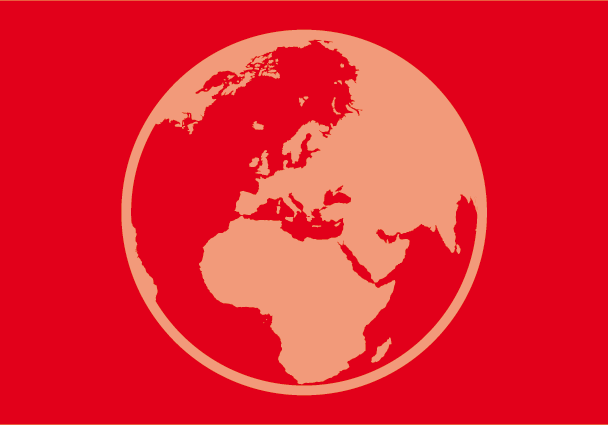
Sep 16, 2014 | Events
Amnesty International, with support from the ICJ, will hold a parallel event, in the margins of the UN Human Rights Council’s 27th session in Geneva, on armed drones and international law, to be held on Thursday 18 September 2014 at 13:30 in room XXIV of the Palais des Nations.









